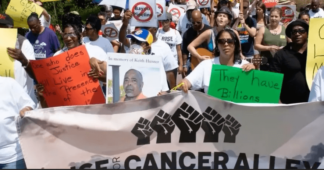“EPA lacks a legal human health assessment of glyphosate to support its current use,” said a lawyer for the Center for Food Safety.
By Julia Conley
Dec 13, 2023
Citing research from the U.S. government’s own National Institutes of Health, a coalition of environmental and farmworkers groups said Wednesday that the U.S. Environmental Protection Agency is out of excuses for continuing to allow the use of the herbicide glyphosate, which has been linked to cancer in people who are exposed to it.
The Center for Food Safety (CFS) filed a petition with the EPA on behalf of Beyond Pesticides and four farmworkers groups, including Alianza Nacional de Campesinas, saying glyphosate’s registration in the U.S. is illegal.
The petition was filed a week after cancer scientists at the NIH published a study in Environmental Health Perspectives, which found that male farmers had “markers of genotoxicity” when they reported high levels of glyphosate use.
BREAKING?: We just filed a groundbreaking legal action calling on EPA to immediately suspend and cancel the dangerous herbicide glyphosate, laying out how it's current registration is illegal. #glyphosate #pesticides https://t.co/9lTw6TT0mq
— Center for Food Safety (@CFSTrueFood) December 13, 2023
The study is only the latest to link glyphosate, the active ingredient in the widely used weedkiller Roundup, with cancer and other health issues. The World Health Organization’s International Agency for Research on Cancer warned in 2015 that glyphosate is “probably carcinogenic to humans,” and Roundup manufacturer Monsanto—now owned by Bayer—was ordered to pay more than $2.3 billion by juries in 2018 and 2019 for failing to warn the public about the product’s risks.
“Farmworker women and their families have experienced the damaging health effects of pesticides for far too long,” said Mily Treviño-Sauceda, executive director of Alianza Nacional de Campesinas. “EPA must protect the nation’s farmworkers and our environment by immediately suspending and canceling all glyphosate registrations.”
Last year, the U.S. Court of Appeals for the 9th Circuit struck down the EPA’s claim that glyphosate is safe.
Despite the mounting evidence of the harmful effects of glyphosate, said CFS on Wednesday, “EPA has declined to act.”
“EPA lacks a legal human health assessment of glyphosate to support its current use,” the group said.
Pegga Mosavi, an attorney at CFS, said the petition provides the Biden administration with “a blueprint… to do what the law and science require and finally cancel glyphosate’s registration.”
“There is a wealth of scientific evidence demonstrating that glyphosate endangers public health, and poses cancer risks to farmers and other Roundup users,” said Mosavi. “Glyphosate formulations are also an environmental hazard and have driven an epidemic of resistant weeds that plague farmers. After last year’s court decision, EPA has no legal legs to stand on. EPA must take action now.”
Environmental Health Perspectives also published an opinion article by health researchers who found the NIH study should be considered in glyphosate safety evaluations.
“There is really compelling new science out there,” Bill Freese, science director at CFS, toldThe Guardian. “It’s becoming increasingly untenable for the agency to deny the cancer hazard.”
The group said the EPA should suspend the use of glyphosate—which is already banned for household use in France, the Netherlands, and Belgium, and for public use in Germany—until its registration can be canceled or the agency can prove the herbicide meets required safety standards under the Federal Insecticide, Fungicide, and Rodenticide Act (FIFRA).
“In accordance with FIFRA, EPA can register a pesticide only upon determining that it will cause no unreasonable adverse effects on the environment when used in accordance with widespread and commonly recognized practice,” reads the executive summary of the petition. “Glyphosate remains registered despite no demonstration by EPA that it can meet the required FIFRA safety standard for this herbicide’s currently approved uses. In other words, glyphosate as it’s currently used has no legal safety assessment on record.”
Freese noted that in the past, the EPA acknowledged glyphosate’s adverse effects on the liver, kidneys, reproductive system, and its link to cancer.
“But as Monsanto sought ever wider uses for its blockbuster herbicide,” said Freese, EPA consigned those incriminating studies to regulatory oblivion, thus facilitating greater use, even as independent scientists confirmed the harms EPA now denies.”
We remind our readers that publication of articles on our site does not mean that we agree with what is written. Our policy is to publish anything which we consider of interest, so as to assist our readers in forming their opinions. Sometimes we even publish articles with which we totally disagree, since we believe it is important for our readers to be informed on as wide a spectrum of views as possible.











